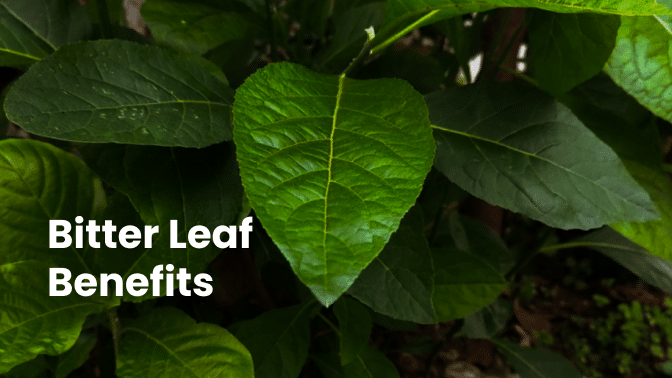Bitter leaf, scientifically known as Vernonia amygdalina, is a small, versatile plant native to Africa. This perennial shrub has been an integral part of traditional African medicine for centuries, and its therapeutic properties have recently caught the attention of researchers worldwide.
In this blog post, we’ll explore the impressive health benefits of bitter leaf and its applications in maintaining overall well-being.
Nutritional Profile of Bitter Leaf
Bitter leaf is packed with essential vitamins, minerals, and phytochemicals that contribute to its potent health benefits. Some key components include:
- Vitamins: A, C, and E, which act as antioxidants and support immune function
- Minerals: calcium, potassium, and iron, necessary for maintaining strong bones, proper muscle function, and red blood cell production
- Phytochemicals: flavonoids, saponins, and alkaloids, which possess antioxidant and anti-inflammatory properties
Bitter Leaf and Diabetes
Research has shown that bitter leaf can help regulate blood sugar levels and improve insulin sensitivity, making it a promising natural remedy for diabetes management. It is believed that the plant’s alkaloids and other phytochemicals work together to enhance glucose utilization and reduce glucose absorption in the intestines.
Immune System Support
Bitter leaf’s anti-inflammatory, antimicrobial, and antiviral properties make it a powerful ally for the immune system. Its antioxidant content helps protect cells from damage caused by free radicals, while its anti-inflammatory compounds aid in reducing inflammation, which is linked to various chronic diseases.
Digestive Health Benefits
Bitter leaf can provide relief from constipation and promote overall digestive health. Its fiber content helps to improve bowel movements, while its detoxification properties aid in eliminating harmful substances from the body.
Read Also: Bitter leaf soup during pregnancy. It's safe? Benefits and Side effects
Weight Loss and Metabolism Boost
Bitter leaf can help suppress appetite and promote caloric burning, making it a useful addition to weight loss efforts. Its bitter taste stimulates the production of digestive enzymes, which can boost metabolism and improve digestion.
Cardiovascular Health
Bitter leaf’s ability to reduce cholesterol levels and regulate blood pressure makes it an excellent choice for maintaining cardiovascular health. Its antioxidants and anti-inflammatory compounds help prevent the buildup of plaque in the arteries, reducing the risk of heart disease.
Cancer Prevention
Bitter leaf’s anticancer properties and free radical scavenging capabilities make it a promising candidate for cancer prevention. Research suggests that its phytochemicals can inhibit the growth and spread of cancer cells, although more studies are needed to confirm these findings.
Liver and Kidney Health
Bitter leaf’s hepatoprotective effects help safeguard the liver from damage caused by toxins, while its ability to improve renal function can aid in maintaining healthy kidneys. Its detoxifying properties further support these organs by eliminating harmful substances from the body.
Skin and Hair Benefits
Bitter leaf can promote wound healing and hair growth, thanks to its antioxidant and anti-inflammatory properties. Its antimicrobial activity also helps protect the skin from infections.
Potential Side Effects and Precautions
While bitter leaf is generally considered safe, some individuals may experience allergic reactions or gastrointestinal discomfort. Pregnant and breastfeeding women, as well as people with liver or kidney disease, should consult their healthcare provider before consuming bitter leaf. Always adhere to recommended dosages and consumption guidelines.
Some potential side effect includes:
- Stomach upset: Bitter leaf can cause stomach discomfort, diarrhea, or abdominal pain in some individuals, especially when consumed in large quantities.
- Hypotension: Bitter leaf may lower blood pressure, which can be beneficial for individuals with hypertension. However, for those with normal or low blood pressure, excessive consumption might lead to hypotension, dizziness, or fainting.
- Drug interactions: Bitter leaf may interact with certain medications, such as anticoagulants, blood pressure medications, or diabetes medications. If you are on any medication, consult your doctor before consuming bitter leaf.
- Allergic reactions: Some individuals may be allergic to bitter leaf, leading to symptoms like itching, rash, swelling, or difficulty breathing. If you experience any of these symptoms, stop consuming bitter leaf and consult your doctor.
- Pregnancy and breastfeeding: The safety of bitter leaf during pregnancy and breastfeeding is not well-studied. It’s best to consult your healthcare provider before consuming bitter leaf if you are pregnant or breastfeeding.
Incorporating Bitter Leaf into Your Diet
You can incorporate bitter leaf into your diet through various recipes, including soups, teas, and smoothies. Alternatively, bitter leaf supplements are available in the form of capsules, powders, and extracts.
Conclusion
Bitter leaf offers an array of health benefits, from blood sugar regulation to immune system support. Its rich nutritional profile and traditional medicinal uses make it an attractive option for those looking to improve their overall well-being. As more research continues to unveil the plant’s full potential, it’s clear that bitter leaf’s popularity will continue to grow in the world of natural remedies.
By incorporating bitter leaf into your diet or supplement regimen, you can take advantage of its numerous health benefits. However, remember to always consult with a healthcare professional before making significant changes to your diet or lifestyle, especially if you have existing medical conditions or are taking medications. With proper guidance and responsible consumption, bitter leaf can be a valuable addition to your journey toward optimal health.
